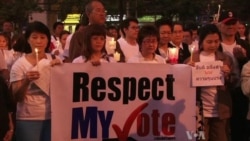BANGKOK —
Thailand's anti-government protesters are a vocal minority who oppose upcoming national elections. But their outspoken rallies, marches, and sit-ins have drawn attention away from the quiet majority who want to cast their votes.
The anti-government protest movement has drawn thousands of supporters in trying to rid Thailand's politics of loyalists to former Prime Minister Thaksin Shinawatra, who was ousted in a 2006 coup.
Protest leader Suthep Thaugsuban said to remove corrupt elements they have to first stop elections and appoint a new ruling council to push through political reforms.
But even some protesters are uneasy about blocking the democratic process.
"Every time [they] have an election I join the vote, but select the good people, right people, and ethical people," one woman said.
A small group of white-dressed demonstrators have been holding regular candlelit rallies asking the anti-government protesters to respect their vote.
Peanpen agreed that political reforms are needed but said stopping the election is not the right way to improve things.
"It means that I think we have to elect first and once we get some people from election than we can reform," she said. "But if you reform before election it means Kun Suthep will select a group of people by himself. [If] it's not from all over the country it means that not every people in this country accept the group that Kun Suthep selects. So, if in that way, it will be a lot of problems."
The United States has criticized protesters for blocking Sunday’s advance voting in parts of Bangkok and the south, calling it a violation of their universal rights.
But as Thailand’s political divide deepens, analyst Thitinan Pongsudhirak says elections alone will not solve the country’s problems.
"Polls are not going to resove the crisis," he said. "Somehow there has to be some agreement with or without polls. What needs to be done in order to regain some kind of consensus for agreement in moving forward. Otherwise the poll is going to be another day of crisis and it will lead to more crisis."
With less than a week to go before Sunday’s polls, there remain few signs of a resolution to break the political impasse.
Gabrielle Paluch contributed to this report.
The anti-government protest movement has drawn thousands of supporters in trying to rid Thailand's politics of loyalists to former Prime Minister Thaksin Shinawatra, who was ousted in a 2006 coup.
Protest leader Suthep Thaugsuban said to remove corrupt elements they have to first stop elections and appoint a new ruling council to push through political reforms.
But even some protesters are uneasy about blocking the democratic process.
"Every time [they] have an election I join the vote, but select the good people, right people, and ethical people," one woman said.
A small group of white-dressed demonstrators have been holding regular candlelit rallies asking the anti-government protesters to respect their vote.
Peanpen agreed that political reforms are needed but said stopping the election is not the right way to improve things.
"It means that I think we have to elect first and once we get some people from election than we can reform," she said. "But if you reform before election it means Kun Suthep will select a group of people by himself. [If] it's not from all over the country it means that not every people in this country accept the group that Kun Suthep selects. So, if in that way, it will be a lot of problems."
The United States has criticized protesters for blocking Sunday’s advance voting in parts of Bangkok and the south, calling it a violation of their universal rights.
But as Thailand’s political divide deepens, analyst Thitinan Pongsudhirak says elections alone will not solve the country’s problems.
"Polls are not going to resove the crisis," he said. "Somehow there has to be some agreement with or without polls. What needs to be done in order to regain some kind of consensus for agreement in moving forward. Otherwise the poll is going to be another day of crisis and it will lead to more crisis."
With less than a week to go before Sunday’s polls, there remain few signs of a resolution to break the political impasse.
Gabrielle Paluch contributed to this report.





